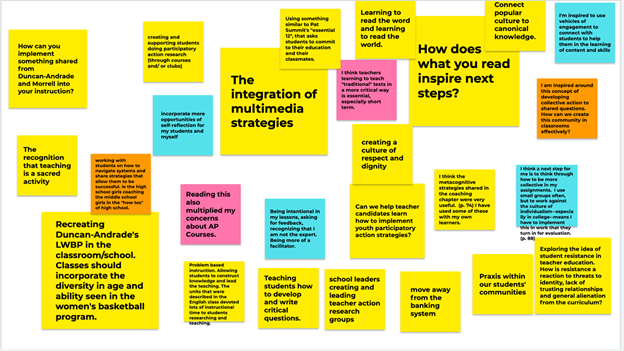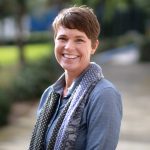Centering Student Voices: Jeff Duncan-Andrade and Critical Pedagogy
By Nicole Gilbertson
March 23, 2021
The events of 2020 have made strikingly visible that schools will need to rethink what currently is and should be the objects of student learning and how they organize students to learn in order to address the gross inequities that plague our schools. To begin to interrogate these issues, the UCI Teacher Academy has brought educators together in a variety of contexts to listen and learn from each others’ experiences in order to encourage one another to transform schools and classrooms so all students can thrive. Last November, we had the great fortune to host Dr. Jeff Duncan-Andrade, Professor of Latina/o Studies and Race and Resistance Studies at San Francisco State University, in a “Talk with Teachers” where he shared his expertise fostering humanizing pedagogical practices in the classroom. Dr. Duncan-Andrade launched us into a discussion of the importance of caring for our students, centering student voices, and reexamining the purpose of public schools. He reminded us that as educators we need to be the advocates for our students, particularly students who are hurting, and be brave enough to center youth wellness. He argued we cannot do this alone, this work requires us to deepen our relationships with our fellow educators so we can collectively be the leaders our students need us to be. A participant commented that they were inspired by Duncan-Andrade’s “Emphasis on changing the culture of school to focus on student wellness and the inquiry approach to learning.” Dr. Duncan-Andrade inspired teachers and school leaders to question existing practices and offered suggestions for school transformation along with practical examples that teachers can implement immediately. One educator shared, “I appreciated Jeff’s example of how at the end of each unit of study, he randomly selects 5-7 students to meet with him during lunch and asks questions about what he should change in the unit, what he should keep in the unit, and what should change about the course.” To continue the conversation of Dr. Duncan-Andrade’s ideas, we invited interested educators to interrogate how we can take action to transform schools by exploring his work more deeply in a book club focused around his co-authored book, The Art of Critical Pedagogy: Possibilities for Moving from Theory to Practice in Urban School.
Critical pedagogy is committed to the empowerment of marginalized youth. In their book, Duncan-Andrade and Ernest Morrell share case studies of their work with students in urban schools in Los Angeles and Oakland, California. These case studies offer educators a variety of exemplars of critical pedagogy—from research-based projects in ELA classrooms to community-based research projects to engage in ethnic studies. Duncan-Andrade and Morrell claim that “youth who participated in these projects demonstrated complex academic skill development, their participation in the various activities exhibited motivation and engagement, they developed and demonstrated empowered identities, and they engaged in actions for advancing educational and social justice.” (p.185). Our reading group was inspired by these findings and they shared their intentions for transforming their classrooms based on what they learned (see image below). Some teachers prioritized centering inquiry, while another intended to focus on engaging students in learning that is relevant to their lives, such as integrating popular culture and pertinent issues in their communities.

Curriculum that prioritizes student-centered projects allows teachers to serve as facilitators guiding students to develop questions and engage in research that is relevant to them. However, supporting research skills and academic literacy are not sufficient to practice critical pedagogy. Duncan-Andrade and Morrell emphasize the important role of praxis in education – where inquiry and research are part of a larger process of students engaging in action and reflection and guided by a philosophy and commitment to empower youth to practice change-making in their communities. Central to Dr. Duncan-Andrade’s research is the importance of giving students’ voice in their education and preparing them for action in their communities, which resonated with our bookclub participants. One shared, “Student interests, student voice. There are a number of ways to teach those standards that center the students, their interests and are relevant to them.” We also discussed the dangers of our current policy language of “learning loss” that can be perceived as a deficit model of instruction. We are concerned that this may lead to an emphasis on measuring students who have “fallen behind” and center remediation, “the drill and kill” that we know is ineffective and alienating for students. One teacher suggested that instead we should be, “Rethinking the ways we test students and the ways that we allow them to demonstrate their knowledge.” They suggested that we focus on knowledge development that is not as easily quantified by a standardized testing. Rethinking what learning is may be a first step towards a humanizing curriculum that centers students voices. We agreed that students have learned a lot this past year. Our conversations discussing and analyzing Dr. Duncan-Andrade’s work has inspired me to hope that when students return to class this spring or next fall we can see a meaningful shift in instruction to meet students where they are and support relevant learning. One educator shared, “There is a BIG opportunity here to engage students surrounding the understanding/constructing knowledge of the impact of the pandemic on communities socially, political, economically. Not a “loss” but an opportunity.”

Nicole Gilbertson is Director of the UCI Teacher Academy and Site Director of the UCI History Project. Her educational path as a historian and teacher has allowed her to collaborate with teachers across California to improve history instruction by providing students with engaging and rigorous learning opportunities.
